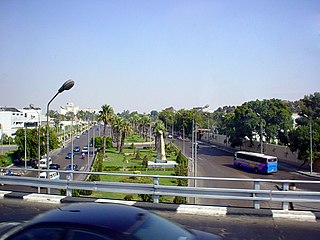Related Research Articles
Thomas Adams was a British architect who was a pioneer of urban planning in the UK and Canada.

The American Planning Association (APA) is a professional organization representing the field of urban planning in the United States. APA was formed in 1978, when two separate professional planning organizations, the American Institute of Planners and the American Society of Planning Officials, were merged into a single organization. The American Institute of Certified Planners is now the organization's professional branch.
The Royal Town Planning Institute (RTPI) is the professional body representing planners in the United Kingdom and Ireland. It promotes and develops policy affecting planning and the built environment. Founded in 1914, the institute was granted a royal charter in 1959. In 2018 it reported that it had over 25,000 members.
The American Institute of Certified Planners (AICP) is the American Planning Association's professional institute. AICP certifies professionals in the United States in the field of town planning and assists planners in the areas of ethics, professional development, planning education, and the standards of planning practice. Members of AICP pledge to adhere to a detailed Code of Ethics and Professional Conduct. Once certified, professional planners may place the designation "AICP" after their name to indicate their membership in AICP, and their mastery of the principles, skills, knowledge, and experience determined by the organization as essential for a professional planner.

Planning Institute of Australia (PIA) is the peak national body representing town planning and the planning profession in Australia. PIA represents approximately 5000 members nationally and internationally. It is governed by a National Board of Directors and managed by a professional administration. It is a member-based organisation with its management complemented by volunteers, who support and contribute to its activities on various levels.

Alexander Ifeanyichukwu Ekwueme was a Nigerian politician who served as the first elected vice president of Nigeria from 1979 to 1983 during the Second Nigerian Republic under President Shehu Shagari as a member of the National Party of Nigeria.
Urban, city, or town planning is the discipline of planning which explores several aspects of the built and social environments of municipalities and communities:

The Canadian Institute of Planners (CIP) is a professional organization in Canada for those involved in land use planning. It is responsible for advocating at national and international levels for members, developing public policy positions, and providing services to members. The Institute has over 8,000 members from across Canada and around the world, and works closely with the eleven Provincial and Territorial Institutes and Associations (PTIAs). It was founded in 1919.
As the peak organisation representing Professional Planners across the globe, the Commonwealth Association of Planners, abbreviated to CAP, has championed, promoted and connected planners and planning since its inception almost 50 years ago.
An urban planner is a professional who practices in the field of town planning, urban planning or city planning.
The Global Planners Network is a group of spatial planning institutes and other organizations, who have signed the Vancouver Declaration. Current GPN membership extends to 25 organizations representing more than 150,000 planners.
Oliver Weerasinghe, OBE, FRIBA was a Sri Lankan architect and diplomat. He was Sri Lanka's first City Planner and for this reason, he is referred to as the "Father of Sri Lanka's Town Planning". He is a former Ambassador to the United States.
Sylvester Ayodele Arise is a Nigerian senator who represents the People's Democratic Party (PDP) in Ekiti State. He became a member of the Nigerian Senate in 2007.
Urban planning education is a practice of teaching and learning urban theory, studies, and professional practices. The interaction between public officials, professional planners and the public involves a continuous education on planning process. Community members often serve on a city planning commission, council or board. As a result, education outreach is effectively an ongoing cycle. Formal education is offered as an academic degree in urban, city, rural, and/or regional planning, and more often awarded as a master's degree specifically accredited by an urban planning association in addition to the university's university-wide primary accreditation, although some universities offer bachelor's degrees and doctoral degrees also accredited in the same fashion; although most bachelor's degrees in urban planning do not have the secondary-layer of urban planning association accreditation required for most positions, relying solely on the university's primary accreditation as a legitimate institution of higher education. At some universities, urban studies, also known as pre-urban planning, is the paraprofessional version of urban and regional planning education, mostly taken as a bachelor's degree prior to taking up post-graduate education in urban planning or as a master's or graduate certificate program for public administration professionals to get an understanding of public policy implications created by urban planning decisions or techniques.

Urban planning, also known as town planning, city planning, regional planning, or rural planning in specific contexts, is a technical and political process that is focused on the development and design of land use and the built environment, including air, water, and the infrastructure passing into and out of urban areas, such as transportation, communications, and distribution networks, and their accessibility. Traditionally, urban planning followed a top-down approach in master planning the physical layout of human settlements. The primary concern was the public welfare, which included considerations of efficiency, sanitation, protection and use of the environment, as well as effects of the master plans on the social and economic activities. Over time, urban planning has adopted a focus on the social and environmental bottom lines that focus on planning as a tool to improve the health and well-being of people, maintaining sustainability standards. Similarly, in the early 21st century, Jane Jacobs's writings on legal and political perspectives to emphasize the interests of residents, businesses and communities effectively influenced urban planners to take into broader consideration of resident experiences and needs while planning.
Darius Dickson IshakuCON, FNIA, FNITP is a Nigerian architect, urban planner, university lecturer and politician. He is a member of the Peoples Democratic Party and served as the governor of Taraba State from May 2015 to May 2023.

Urban planning in Africa results from indigenous aesthetics and conceptions of form and function as well as the changes brought on by industrialization, modernization, and colonialism. Before the Berlin Conference of 1884 – 1885, which formalized colonialism in many parts of Africa, indigenous African cities and villages had ordered structures that varied along ethnic and religious lines and according to geography. All land-uses necessary for functioning––markets, religious sites, farms, communal assembly spaces––existed in ordered, rational ways, as did land property practices and laws, many of which changed under colonial control. Urbanity changed significantly from pre-colonial to colonial times, as slavery, Christianity, and a host of other forces caused a change in the population of indigenous urban dwellers.
The Town Planners Registration Council of Nigeria (TOPREC) is the government body established by General Ibrahim Babangida's regime through its Decree 3 of 1988, which became an Act of Parliament in 2004. The council was established to protect, regulate, and control the practice of the profession of urban and regional planning in all aspects throughout Nigeria.
Uko Ndukwe Nkole is a Nigerian politician and member of the Nigerian National Assembly. Nkole was the representative from Arochukwu/Ohafia in the Federal House of Representative in the 8th and 9th assemblies. He did not contest for reelection to the House of Assembly in 2023.

Dominic Gambo Yahaya is the current monarch of Atyap Chiefdom, a Nigerian traditional state in southern Kaduna State, Nigeria. He is also known by the title Agwatyap III.